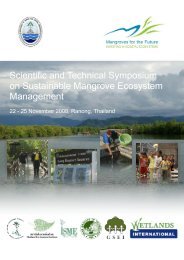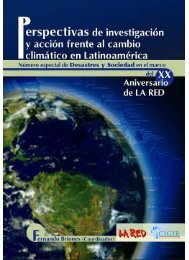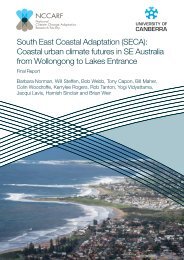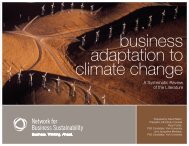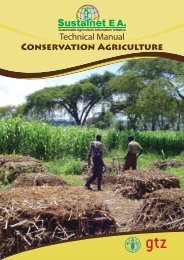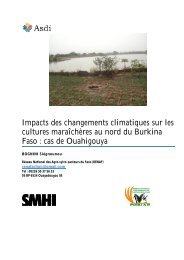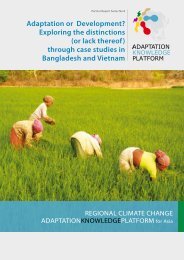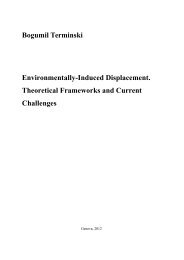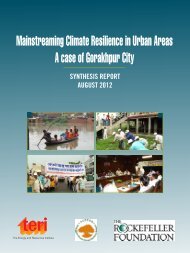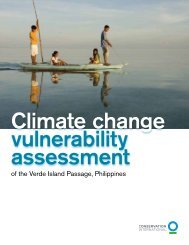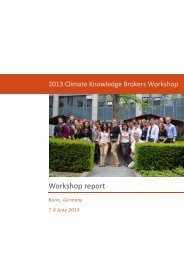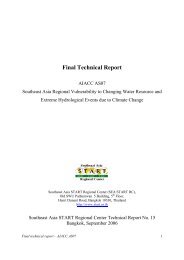Urban food security, urban resilience and climate change - weADAPT
Urban food security, urban resilience and climate change - weADAPT
Urban food security, urban resilience and climate change - weADAPT
You also want an ePaper? Increase the reach of your titles
YUMPU automatically turns print PDFs into web optimized ePapers that Google loves.
community <strong>food</strong> growing can have on society <strong>and</strong> the environment in addition to thecalorific <strong>and</strong> nutritional benefits obtained from locally-grown <strong>food</strong>.4.1.6 What are the barriers to the more widespread adoption of <strong>urban</strong>agriculture in Australian cities?Little now happens in cities of the developed world, including Australian cities, that isnot subject in some way to regulation by the institutions of government or by legislation.Buildings cannot be erected, l<strong>and</strong> uses <strong>change</strong>d, commercial activities undertaken,social activities carried out on public l<strong>and</strong> without obtaining the requisite permit,approval or licence. Moreover, if the necessary approval has not been granted (<strong>and</strong>sometimes even if it has), the relevant authority will often be contacted by a disgruntledcitizen concerned with nuisance from ‘inappropriate’ activities.When Australian cities grew in the 19th century the rights of property owners – takenfor granted; included the right to cultivate their own property, <strong>and</strong> to keep anassortment of animals for <strong>food</strong>. Since then a range of concerns, primarily about publichealth, neighbourliness <strong>and</strong> local amenity have presaged the introduction of a complexweb of regulations that limit the scope <strong>and</strong> practices of <strong>urban</strong> agriculture.Proposals to relax local regulations covering the keeping of chickens <strong>and</strong> other animalson properties in the city of the Gold Coast were met with somewhat predicableresponses which illustrate the persistence of debates about the proper place of ‘rural’activities in <strong>urban</strong> areas. The Chair of the Cultural <strong>and</strong> Community DevelopmentCommittee of Gold Coast City Council was quoted as saying:Would you like to live next door to someone who’s got chickens clucking aroundplus the potential smell <strong>and</strong> everything else that comes with it...It’s not like a pet,a companion like a cat or a dog, <strong>and</strong> I think if you want to do that, suburbia is notthe place for that, I really don’t think it is, so I totally disagree with it. (Gold CoastBulletin, 2 March 2010, accessed online 16 October 2012:http://www.goldcoast.qld.gov.au/council/cr-robert-la-castra-768.html).A similar proposal two years later to allow small farm animals such as pigs <strong>and</strong> goatson lots of less than 2000m 2 drew the following response from the same councillor:‘Do we want to turn the city into a third world country? We’ll turn the city into azoo. We have zoning for a reason.(Gold Coast Bulletin, 21 August 2012, accessed online 16 October 2012,http://www.goldcoast.com.au/article/2012/08/21/437011_gold-coast-news.html)Thus, a somewhat abstract belief that cities (including their suburbs) are no place forchickens, results in a specific local law that proscribes the minimum lot size if one is tokeep chickens, pigs or other ‘farm’ animals.While the regulations driven by public health concerns are typically implemented <strong>and</strong>enforced by local government officials, probably the most influential regulators of <strong>urban</strong>agriculture have been planners (whether called <strong>urban</strong> planners, town planners,environmental planners or city planners). Of course, debates about the relationshipbetween planning <strong>and</strong> <strong>food</strong> <strong>security</strong> are not new. Peter Self’s influential book, Cities inFlood (1957) devoted a chapter to ‘<strong>food</strong> versus homes’ <strong>and</strong> to a critique of British<strong>Urban</strong> <strong>food</strong> <strong>security</strong>, <strong>urban</strong> <strong>resilience</strong> <strong>and</strong> <strong>climate</strong> <strong>change</strong> 28



